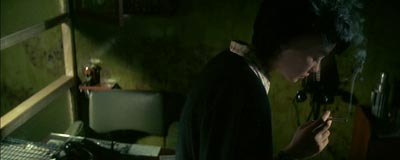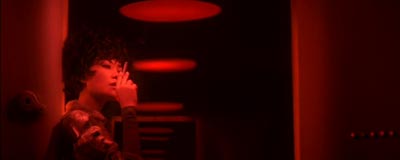2046
Noir-ish treatise on relationships. A beautiful, fragile work.

Director Kar Wai Wong made a name for himself in the relationship drama sector of the market, saying which is really just a way for me to avoid calling them love stories. I, of course, have my hardcore street credibility to think of and can't go around saying that I like movies with titles like In The Mood For Love. Where's the promise of evil robot monkeys spewing hot laser death in that? It comes as something of a blow then as 2046 stumbles into the broader minded multiplexes of Blighty, as it's an early contender for film of the year. Never really wanted street cred anyway.
No two ways about it, this is a love story but not in the usual rom-com boy-meets-girl sense. This follows the story of Chow Mo Wan (the ever dependable Tony Leung), a journalist and writer of somewhat steamy novels in Hong Kong over the latter half of 1960. Many of his experiences and characters of real life find their way into his novels, most successful of which being the titular 2046. The film takes the occasional delve into the world of this novel from time to time, a stylish, slightly kitsch sci-fi vision set on a train travelling to an obscure area named 2046.
I mention this now to forestall any confusion over any screenshots and promo material not looking particularly true to 1960's Hong Kong. While the actual plot isn't particularly convoluted and certainly nothing like as contrived as you may have been lead to expect it does contain enough abstractions to make it difficult to recap in any detail without seeming so. Anyhoo, Chow's something of a serial womaniser, never wanting to be tied down to any relationship in particular. Moving into a hotel, room number 2047 (his sentimental first choice of 2046 already occupied) the narrative shows Chow's interactions with a few of the hotel's characters.

Foremost amongst these relationships is an affair with the occupier of room 2046, the luscious Bai Ling (an incandescent Ziyi Zhang). Also prominent in Chow's life is Wang Jing Wen (Faye Wong), daughter of the opera loving hotel proprietor (Wang Sum). Jing Wen is something of an amateur writer and ends up co-writing with Chow, occasionally ghostwriting his newspaper columns. Jing Wen falls in love with a visiting Japanese businessman, but her father's disapproval forces them to split as he heads home without her. Cue distress, but unlike the demons that we eventually find out Chow's dealing with these can dispelled, and Chow encourages Jung Wen down this path in his inimitable low key style.
If you want comparisons, the closest mainstream movie I can think of would be Lost In Translation. Not a simile to be undertaken lightly, but 2046 shares not only a set of downbeat, touching insights into the human condition but also the quality and flourishes of beauty that make both movies so affecting and haunting. Touching the central theme of Coppola's masterpiece (normally I'd say it's far too early to bandy such terms about but it's a no brainer in Lost In Translation's case), a love you can't have, there's also a heady mix of unrequited love, misplaces transferal of emotions between relationships and a sad truth that finding true happiness and true, lasting love is almost random chance, a gamble in which some are fated to lose.
The damage caused when a love affair goes wrong will surely be an unwelcome but familiar feeling to all but the most sheltered or fortunate amongst us, and Chow carries the type of hurt that can leave one hollow inside. He's continuing on, but as seen by his writing he knows he's doomed to trying to recapture lost memories with different people. That this can't work is unfortunate, the fact that it's causing wounds for the people who fall for him is tragic. After a souring of their relationship Chow comments on how much Bai Ling has changed and how sad he feels for her, but he doesn't seem to realise that she's now bearing the same wounds as Chow.

This film is beautiful, be it the themes of the narrative or the visuals of the work itself. Some may consider Kar Wai Wong's direction languid, in reality it flows and ebbs like a dream on a warm summer's day. It's almost voyeuristic at points, shots framed as though you're spying on the action just as Chow does on occasion. There's a heavy hint of film noir running through the piece, every shadow telling it's own story. Shots linger on characters like a gentle caress and more of meaning is said with pensive looks and silences than is said in the dialogue. It's the kind of film where the palpable mood and atmosphere of the film threatens to envelope you utterly.
Kudos on the tremendous use of music and orchestral scores, be it the original themes created for the movie, the snippets of opera the hotel manager is so fond of or simply the period music. Complementing the narrative perfectly, perhaps the greatest compliment I can give being that I noticed and greatly appreciated it given that this is the one aspect of movies that typically fades into the background for me, heading straight to the subconscious and bypassing whatever section of my addled brain is responsible for pointing out how good, bad or indifferent what I'm listening to is. The soundtrack for 2046 just fits so damn well and talks directly to one's soul, in no small part helping create the remarkable effect this movie has.
It's simply sumptuous movie making. If every film had this much artistry and beauty the world would be a better place. The kind of atmospheric journey that reaffirms faith that there is still cinematic works of art being made amongst what at times seems an overwhelming torrent of insipid garbage. If you cannot relate Chow's experience and bitterly earned insights into your own life then you're either exceptionally fortunate or completely lacking a soul. This is only a foreign language film in that the characters are speaking in Chinese, the themes and experiences so universal that subtitles on occasion seem unnecessary.

In case it's not at all obvious from the above ramblings, the films effectiveness is not just due to Kar Wai Wong's technical nous but the performances he's eeked from the talented cast. It's about as close to an all star Chinese cast as we've seen lately, with the never less than excellent Tony Leung's stock rarely higher off the back of the Infernal Affairs trilogy and fellow lead Ziyi Zhang proving (after a slightly hamstrung performance in House of Flying Daggers) that she's more than just a tremendously pretty face. Both give near flawless, touching turns that are backed up by equally fine performances from the supporting cast.
Not exactly a critical favourite, coming from an apparently disappointing showing at Cannes prompting Kar Wai Wong to completely re-edit the movie. On release in it's native lands the response wasn't exactly overwhelming, although how much of this is actually warranted and how much is due to the long wait between In The Mood For Love and this is open to debate. Such weighty expectations often lead to disappointment even if the movie itself is of a high quality, and coming from an unbiased (or more accurately an ignorant) perspective I've a sneaking sensation that's where the problem lies. There's a good chance this is exactly what I experienced with the whole Hero / House of Flying Daggers thing.
2046 is an early contender for film of the year, as far as I'm concerned. It may perhaps hit a few too many abstractions for some and if the atmosphere Kar Wai Wong has created doesn't wrap you up in the same way as I the measured pacing of the piece may have you twiddling your thumbs. That alone would typically give me pause to knock a mark off the score in a bid to make it more reflective of what I imagine to be more widespread tastes, but for something I've liked this much wider public opinion can get shafted. It's the most remarkable, melancholic, beautiful and fragile work of art I've seen in some time and giving it any less than the highest honours seems inexcusable.
Were I in the business of passing quantifiable judgements, I'd award this 5/5 TippyMarks.
Li Gong (Su Li Zhen)
Takuya Kimura (Tak)
Faye Wong (Wang Jing Wen)
Ziyi Zhang (Bai Ling)
Carina Lau (Lulu / Mim)
Wang Sum (Mr. Wang / Train Captain)